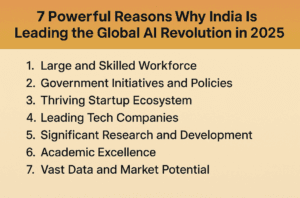AI Breakthrough: 7 Powerful Reasons Why India Is Leading the Global AI Revolution in 2025
India is emerging as a global leader in Artificial Intelligence, driven by strong public interest, educational reforms, and government support. The Bosch Tech Compass 2024 highlights that 89% of Indians believe AI will soon be part of everyday life, and a large number are already upskilling through courses and self-learning. The education sector is adapting quickly, with states like Tamil Nadu, Kerala, Karnataka, and Telangana integrating AI and coding into school curriculums. Tamil Nadu, in particular, is rolling out high-tech labs and smart classrooms across thousands of schools.
There’s also growing belief in AI’s power to improve lives and solve big challenges like climate change. At the same time, people are aware of AI’s risks and are calling for ethical guidelines in its use. A majority of Indians want AI taught from an early age and see it as essential for future careers. This blend of optimism, preparation, and responsibility positions India to lead the AI-driven future with confidence.

AI Breakthrough: 7 Powerful Reasons Why India Is Leading the Global AI Revolution in 2025
India is charging ahead into the era of artificial intelligence (AI), fueled by optimism and proactive preparation. According to the Bosch Tech Compass 2024, a global survey analyzing public attitudes toward emerging technologies, the country stands out for its enthusiasm and readiness to adopt AI. With a strong focus on education, innovation, and ethical practices, India is positioning itself as a frontrunner in the global AI revolution.
Overwhelming Confidence in AI’s Impact
Indians are remarkably hopeful about AI’s potential to reshape daily life. The survey reveals that 89% of Indian respondents expect AI to become integral to everyday activities in the near future. This optimism surpasses global trends, where roughly 80% of people express interest in learning AI-related skills. In India, however, this interest has already translated into action: 59% of citizens are actively educating themselves through self-study or formal courses, outpacing participation rates in Europe and the United States.
Guruprasad Mudlapur, President of the Bosch Group in India, emphasizes that AI is transforming workplaces and industries, making skill development critical. Bosch itself prioritizes responsible AI adoption, ensuring employees are equipped to use the technology ethically and effectively.
Education as the Foundation for AI Growth
A key driver of India’s AI momentum is its focus on education. While people worldwide agree that AI should be part of school curricula, Indians are particularly vocal about this need. Around 60% believe the government should spearhead AI education initiatives.
Several states are already leading the charge. Tamil Nadu, for instance, plans to integrate AI and coding into its school curriculum for students in Classes 6 to 9 starting in the 2025–2026 academic year. To prepare, the state is upgrading thousands of schools with high-tech labs and smart classrooms. Over 8,000 middle schools will receive computer labs, while 22,000 primary schools will adopt smart classroom tools. Additionally, Tamil Nadu has partnered with Microsoft to launch the TEALS program in 100 schools, aiming to bridge the digital divide and prepare students for tech-driven careers.
Other states are making strides too. Kerala introduced AI modules in Class 7 ICT textbooks, reaching over 400,000 students. Karnataka and Telangana are leveraging AI-powered tools to enhance foundational skills in reading and math, improving both learning outcomes and student attendance.
Balancing Hope with Responsibility
Indians overwhelmingly view technology as a force for good—84% believe it can create a better world, and 63% consider AI the most transformative technology of the next decade. Many also see AI as a solution to global challenges like climate change.
However, the excitement is tempered by caution. Concerns about job displacement, academic dishonesty, and social inequality linked to AI adoption are widely acknowledged. A striking 86% of respondents stress the need for clear regulations and ethical guidelines to ensure companies use AI responsibly.
Imagining an AI-Powered Tomorrow
The survey highlights India’s bold vision for AI’s future. Some respondents envision AI winning a Nobel Prize, resolving political conflicts, or even humanoid robots breaking Olympic records. These imaginative ideas reflect India’s unique blend of creativity, confidence, and ambition to lead in tech innovation.
A Global Leader in Ethical AI Development
The Bosch Tech Compass surveyed seven countries, including the U.S., Germany, China, and Brazil. Among them, India emerged as a standout for its eagerness to learn, optimism about technology’s benefits, and insistence on ethical AI practices. By prioritizing education, fostering innovation, and advocating for responsible use, India is not just preparing for an AI-powered future—it’s shaping it.
With its dynamic approach, the nation is poised to become a global hub for AI development, demonstrating how technology can drive progress while addressing societal challenges. As India continues to invest in skills, infrastructure, and governance, it sets an example of how optimism and responsibility can coexist in the age of artificial intelligence.
You must be logged in to post a comment.